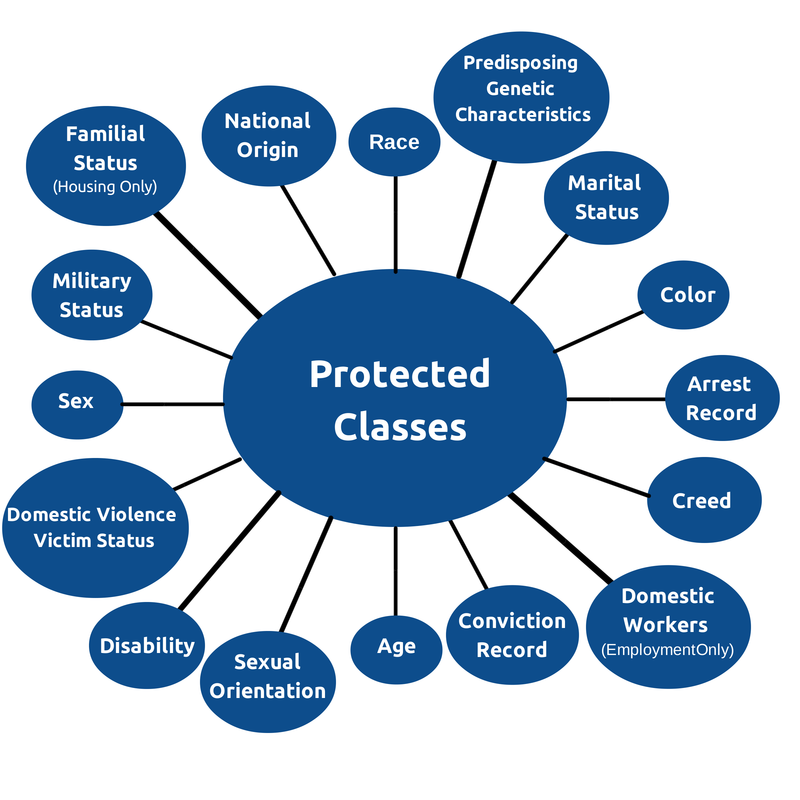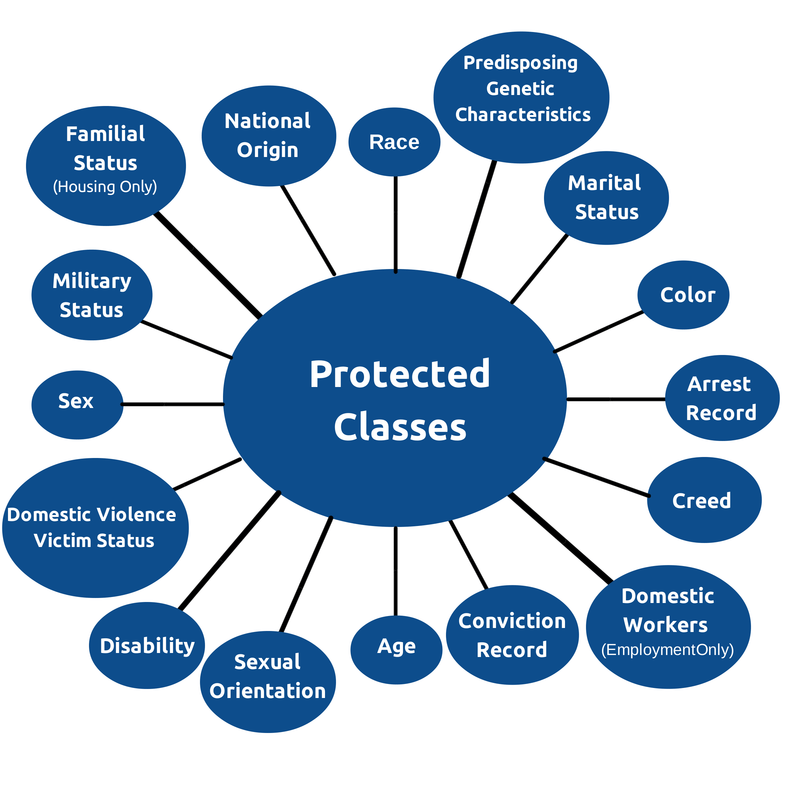Things you should not have your clients put in a letter to a buyer or seller.
Protected Class
-
Race.
-
Color.
-
Religion or creed.
-
National origin or ancestry.
-
Sex.
-
Age.
-
Physical or mental disability.
-
Veteran status.
-
Genetic information.
-
Citizenship.More…
Discrimination is treating people differently. Discrimination is unlawful when it is based on a personal trait or characteristic protected under Human Rights Law. The traits that are protected under Human Rights Law are called Protected Classes. It is unlawful to discriminate against a member of a protected class when it comes to housing, employment, public accommodation, credit and lending, certain educational institutions, and volunteer firefighting organizations.
Rights
All citizens should be aware of their rights under Human Rights Law, including their right to file complaints against alleged acts of discrimination. In order for an alleged discriminatory act to be illegal, there must be a connection between what happened to you and the trait/characteristic protected by the Human Rights Law. Making a Human Rights complaint is free for the person making the complaint.Responsibilities
If you are an employer, housing professional, lending institution, or business, it is important to understand your responsibilities under the Human Rights Law. Awareness of the laws can help you create equitable environments in our community, as well as prevent costly and time-consuming legal proceedings.
Descriptions of Protected Classes
Age
The Human Rights Law protects person(s) age 18 or older. A person cannot be discriminated against on the basis of his or her age in the area of employment or housing. Age discrimination usually occurs in employment when older workers are fired, replaced by younger workers, or treated differently than younger colleagues. Employees cannot be forced to retire except for very limited situations relative to tenured professors and certain highly paid executives.
Creed
Relates to a person’s religious beliefs. The wearing of religious garb and the observance of religious holidays and practices are protected under the Human Rights Law.
Race & Color
Race and color pertains to a person’s racial background and/or skin color.
Sex
Discrimination on the basis of sex includes unequal treatment in the workplace, sexual harassment, and pregnancy discrimination. Under the Human Rights Law, men and women are entitled to equal pay, benefits, working conditions, and seniority rights; men and women are entitled to be free from unwelcome sexual advances, requests for sexual favors, physical or verbal conduct of a sexual nature, and a hostile work environment; and pregnant women are guaranteed the right to work, and to enjoy the same medical, vacation and disability leave policies as non-pregnant co-workers. Although sex discrimination occurs most frequently in the workplace, it also occurs in areas concerning housing, credit, and public accommodations.
Sexual Orientation
The Sexual Orientation Non-Discrimination Act of January 16, 2003, amends the New York State Human Rights Law to prohibit actual or perceived sexual orientation discrimination in places of public accommodation, non-sectarian educational institutions, credit transactions, housing, commercial property, and in obtaining employment. Sexual Orientation is defined as gay, lesbian, bisexual, heterosexual, and asexual.
National Origin
Is based on one’s national group and includes one’s ancestry.
Marital Status
A person may not be discriminated against on the basis of whether or not he or she is married, divorced, single, separated or widowed.
Domestic Violence Victim Status
The New York State Human Rights Law was amended effective July 7, 2009 to provide protection from employment discrimination for victims of domestic violence. The Human Rights Law defines a domestic violence victim as an individual who is a victim of an act, which would constitute a family offense under N.Y. Family Court Act § 812. It is unlawful to discriminate against a domestic violence victim in employment and housing.
Disability
A disability is a physical, mental, or medical impairment resulting from anatomical, physiological, or neurological conditions that prevent the exercise of a normal bodily function or is demonstrable by clinical or laboratory diagnostics techniques. If a person has a record of a disability or is perceived by others to have a disability, whether or not the person does, he or she is also protected under the Human Rights Law. Under the jurisdiction of employment, a person is protected when the disability does not interfere with the ability to reasonably perform job duties. It is illegal to discriminate against people who have, are perceived to have, perceived to be at risk for HIV/AIDS.
Military Status
Discrimination on the basis of military status involves denying equal employment opportunity to any person because of that person’s past, current or future membership, service or obligation in a uniformed service.
Arrest & Conviction
It is unlawful for any person, agency, bureau, corporation or association, including the State and any political subdivision thereof, to deny employment because of an individual’s conviction record, where such denial is in violation of Article 23-a of the Correction Law. A potential employer cannot make any inquiry about an arrest record, but can inquire if a potential employee has been convicted of a crime.
Predisposing Genetic Characteristics
Employment discrimination on the basis of genetic predisposition or carrier status is prohibited by the Human Rights Law. The legislature added this protection to the law in 1996.
Familial Status (in housing only)
Discrimination in the rental, purchase, or lease of housing on the basis of familial status is prohibited. Familial status means any person who is pregnant, has a child, or is in the process of securing legal custody of any individual under the age of 18; or one or more individuals under the age of 18 living with a parent, a legal guardian, or a designee of a parent.
Domestic Workers (in employment only)
It is unlawful for an employer to engage in unwelcome sexual advances, requests for sexual favors, or other verbal or physical conduct of a sexual nature to a domestic worker when: (i) submission to such conduct is made either explicitly or implicitly a term or condition of an individual’s employment; (ii) submission to or rejection of such conduct by an individual is used as the basis for employment decisions affecting such individual; or (iii) such conduct has the purpose or effect of unreasonably interfering with an individual’s work performance by creating an intimidating, hostile, or offensive working environment.

Why an Agent Is Essential When Pricing Your House
Why an Agent Is Essential When Pricing Your House Some Highlights When it comes to pricing your house, there’s a lot to consider. The only way to ensure you price it right is by partnering with a local real estate professional. To find the best price, your agent...

A Recession Doesn’t Equal a Housing Crisis
If you're following the news, you might be wondering what could happen to the housing market if there's a recession. Let's connect to discuss why history shows a recession doesn't equal a housing crisis.Buy or Sell with Marty Gale "Its The Experience" Principal Broker...

The Average Homeowner Gained $64K in Equity over the Past Year
The Average Homeowner Gained $64K in Equity over the Past Year If you own a home, your net worth likely just got a big boost thanks to rising home equity. Equity is the current value of your home minus what you owe on the loan. And today, based on recent home price...
More Americans Choose Real Estate as the Best Investment Than Ever Before
More Americans Choose Real Estate as the Best Investment Than Ever Before Americans’ opinion on the value of real estate as an investment is climbing. That’s according to an annual survey from Gallup. Not only is real estate viewed as the best investment for the ninth...

Why the Growing Number of Homes for Sale Is Good for Your Move Up
Why the Growing Number of Homes for Sale Is Good for Your Move Up Are you thinking about selling your current home? If so, the biggest question on your mind may be: if I sell now, where will I go? If this resonates with you, there’s something you should know....

June is National Homeownership Month
How Homeownership Impacts You June is National Homeownership Month, and it’s the perfect time to reflect on how impactful owning a home can truly be. When you purchase a house, it becomes more than just a space you occupy. It’s your stake in the community,...

Sellers Have an Opportunity with Today’s Home Prices
"IT'S THE EXPERIENCE" It’s difficult to know when is the best time to sell, or how to get the most money for your house, but you don’t need to go through the process alone. You may be wondering if prices are projected to rise or fall…or how much competition you may...
What’s on the Horizon for the Housing Market in the Second Half of 2022?

The One Thing Every Homeowner Needs To Know About a Recession
The One Thing Every Homeowner Needs To Know About a Recession A recession does not equal a housing crisis. That’s the one thing that every homeowner today needs to know. Everywhere you look, experts are warning we could be heading toward a recession, and if true, an...
How Homeownership Can Bring You Joy
How Homeownership Can Bring You Joy If you're trying to decide whether to rent or buy a home, you're probably weighing a few different factors. The financial benefits of homeownership might be one of the reasons you want to make a purchase if you’re a renter, but...

